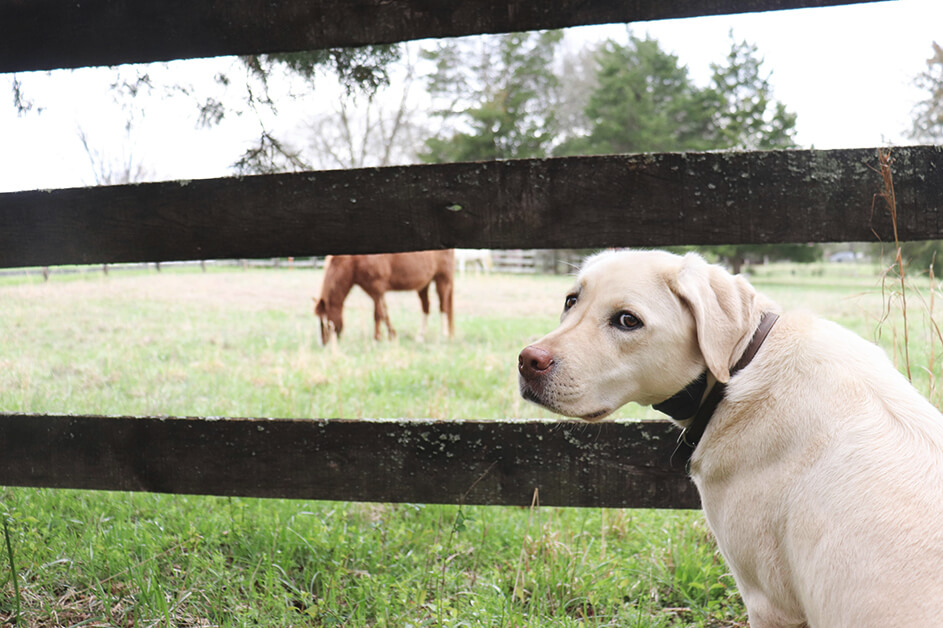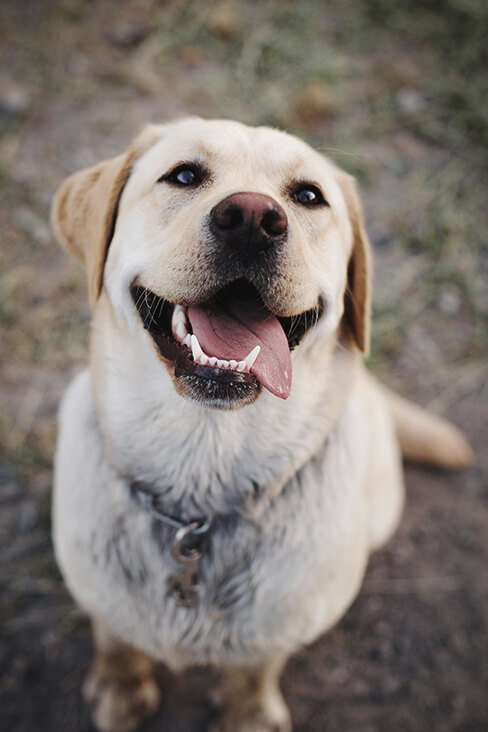
Dogs and horses go together like cookies and milk. Obviously a dog is going to make your horse adventures even more fun, right? Just look at that sweet little face, MMHMM MHMHMM (<- these are smooching noises).
Except it doesn’t always work out. Sometimes it turns out to be a complete nightmare. Imagine trying to ride your horse while your dog barks and chases you, or the horses in their fields. You shut your dog into a horse stall but he still barks constantly. You shut him in the tack room and he eats the saddles. It quickly turns into a very expensive day at the barn.
But it is so tempting to make them mix. Imagine trail rides with your loyal dog following your. Schooling in the arena while your dog sits quietly in the middle, observing quietly. A dog that is very comfortable hanging out on the barn, bothering no one, but showing up for snuggles exactly when you need it. You’re spending time with your two best animal friends.
How do you bring this bliss into your life? It is possible, it just might require some work. So if you want to have a happy life, with both dogs and horses, here’s what you need to know.
Choose the Right Breed
The easiest way to classify and stereotype dogs is going to be by breed. Dogs all have different personalities, just like horses, but due to the thousands of years that humans have been breeding dogs, some are going to have characteristics that are better suited for life on a horse farm.
Typically, a dog breed that is found in the herding, working, or sporting breed groups would be a great farm companion. These dogs are typically know for being outdoor dogs, obedient, and energetic, which are all great characteristics for a farm dog.
But, be wary of dogs that are tiny, or delicate. Horses can kill dogs, and while it can be because they think they are a predator, it can also be completely unintentional. I personally know of a chihuahua that was killed by a horse simply stomping at a fly on its leg. The poor dog was just in the wrong place at the wrong time.
Small dogs, simply by nature of being small, are easily injured by horses. As much as you may love to have your teacup dog with you at all times, they are simply too frail to have at a barn. I have two yorkies, so I understand wanting them near me, but I have kept them away from my horses for their whole lives. They just aren’t horse savvy, and it’s far too risky.
Even if you aren’t planning to buy a specific breed of dog, it’s smart to know about the different breeds. If you have a vague idea of breeds that could work for an animal farm, you can know what to look for even when the breed is unknown. Many mystery breeds of dogs found at animal shelters can be great farm dogs. I am not encouraging people to buy a specific breed of dog, but look for a type of dog.
Popular Equestrian Dog Breeds
As seen at horse shows and barns, there’s just some breeds that horse people seem to get over and over again…
Australian Sheep Dog – Loveable piles of fluff that are highly trainable and loyal. Just be prepared for that fluff to be everywhere, and mostly on you, and probably on all your food.
Corgi – Smallish and also weiner-dogish. For the equestrian that needs a mascot and possible merchandising opportunities.
Labrador – The relaxed dog that’s so relaxed, he’s probably taking a nap right in front of the jump, you know, the one you’re currently headed towards. There will be many desperate screams of “MOVE!!!” at your barn with these around.
Jack Russell Terrier – Horse people are known to be crazy, and this is the only dog they could find that’s crazier than they are. If you are not already insane, you will be after dealing with one of these.
The Random Mixed Breed – A combination of 5 of more breeds that everyone can have fun guessing at but no one can be sure. Random breed traits will show up unexpectedly, like when he suddenly starts sorting the horses in the fields or takes up investment banking.

The Right Personality
Not all dogs are suited to be farm dogs. Not all dogs want to be farm dogs. I’ll use my own dogs as an example.
As I mentioned, I have two yorkies, the small, hairy terriers. The dogs predate the horse farm, and at this point are elderly. But even in their prime my dogs hated to hang out outside. As I mentioned, I never combined the horses and these dogs, but I’d bring them outside for regular dog things, and five minutes later, they are ready to go in. Maybe they were allergic to sunshine and happiness, but for whatever reason, they were not fans. Even if it had been safe to bring them to the barn, if I had, they would have hated it.
The ideal dog would love being outside. They would love exploring and frolicking, like a girl in her cottagecore era. They could hang out by themselves for hours (ideal for when you’re riding), or happily come running when you call to them. They are smart enough to avoid the dangerous things, well trained enough to not chase or harass horses or cars, and, unless you’re very interested in privacy, shouldn’t aggressively bark at people who show up at your barn.
The Right Training
This is possibly the most important step. Dogs need training. They aren’t born knowing how you want them to behave. Unfortunately this is probably the step most people forget about. They just let the dog loose to figure it out.
Dogs need to stay safe on the farm, and need to be pleasant to be around. Dogs that chase horses, or jump up on people are not fun to be around. No one wants to see a dog injured by a horse, or worse. No one wants to go to the barn and immediately be covered in dirt from dog paws. It’s not cute.
Training is important for a well mannered, pleasant dog. Dogs should know how to sit, stay, and come when called. Dogs should know not to chase horses or dig up the arena footing. Dogs should be controllable while you’re on the ground, and listen to commands while you’re on the horse.
Without knowing these things, the dog is just a pest. I think a lot of people ignore the training aspect and just hope that the dog eventually figures it out on their own, but chances are the dog won’t learn unless it’s taught. If you’re a loner with their own farm, who never expects visitors at your barn, and perhaps has a secret entrance or bridge troll guarding your gate, feel free to do whatever, but that rarely happens. Instead your guests, or even random passerby’s or neighbors who are minding their own business, end up being harassed by the dog, or having to deal with your aggressive dog ruining their walk. Not only is this a terrible way to treat people, it also opens you up to liability if the dog causes injury or damage. Not to mention, the law is usually on the side of whoever is victim of the dog. Your dog could end up being killed.
Aggressive dogs are actually a huge pet peeve of mine. I frequently go to stranger’s barns to photograph them – meaning they are paying me to be there and know that I’m coming, and I’m greeted with a strange dog aggressively barking and circling my car. A few times I’ve had the dog jump up on my car door. I don’t know if the owners don’t care or don’t feel they can do anything, but I don’t think that’s acceptable. At the very least just put your dog in the tack room or a stall when you’re expecting visitors.
They always say the same thing though – “Oh, he’s friendly!” Maybe so, but I don’t know your dog. Your dog doesn’t know me. There’s always a chance it’ll go wrong. Or I won’t see your dog as I’m driving. Or your dog scratches my car. It’s less seriously than an injury, but I don’t feel like I should just have to accept my car being damaged.
Another option is to put up invisible fence. Although it might be an investment, your dog will stay safely in the confines of the area you set, with low chances of them going after people, or running out into traffic.
I truly believe that if you are committing to a dog, you need to commit to their training.
Free Dog Training Resources
Kikopup YouTube – Videos on dog training
Behavioral Protocols – Texts based instructions for specific situations.
Simpawtico Dog Training YouTube – Videos on dog training
Dogo App – Dog training app, may have paid features
Bringing Your Dog to as a Lesson Student
If you don’t own the farm you keep your horse at, you might be wondering what the rules are regarding bringing your dog. If you board your horse, you’re going to be at the barn a lot, it makes you sad to think of your dog alone by itself. Or maybe you are a lesson student doing weekly lesson, or your child is in lessons, you might be wondering if you can bring your dog to hang out during the lesson. After all, it’s a beautiful day, your dog doesn’t always get to run around freely at home, and you would love to wear him out, too.
First of all, STOP. Do not just bring your dog with you to the barn, even if it seems like other people are bringing their dogs. Always ask permission. There could be countless reasons why the farm owner doesn’t want more dogs on the property. If the farm dogs are dog aggressive, they might fight. The owner may fear liability issues. Or, the owner just might not want dogs hanging around on her property.
If the owner says it’s okay, then yes, you can bring your dog. But be prepared to actively watch your dog. If your dog has to be tied to a tree and barks the whole time, you can bet it won’t be allowed again. If it chases horses or people riding it could cause serious injury. If you leave it in your car the whole time and it barks at every random thing that passes by, why did you even bring it, its clearly not happy.
One bad dog can ruin it for everyone else that wants to bring their dog. The best way to prepare for this scenario is to make sure your dog is well trained and well socialized. If you’re not sure how it’s going to behave, start with small doses of farm life. Maybe there’s a community farm nearby you can go for walks at, or take the dog to progressively more stressful environments to make sure he’s listening.
If your dog is unobtrusive, friendly, and well mannered, he’s probably be perfect for accompanying you to the barn.
It is possible for horses and dogs to get alone, it just may take some work. Training the dog is the key. See above for resources on training your dog.
When dogs and horses are in harmony, life is easy. You don’t even have to think about what your dogs are up to. You go about your business, and your dogs quietly do their thing. It really is bliss, and you get to hang out with both of your animal best friends.

X23Cal
Hey people!!!!!
Good mood and good luck to everyone!!!!!